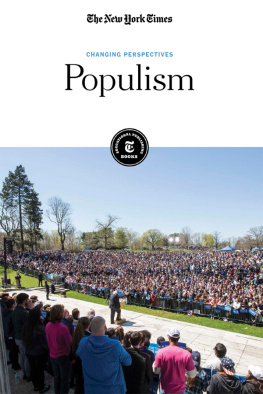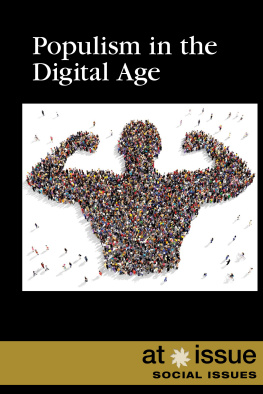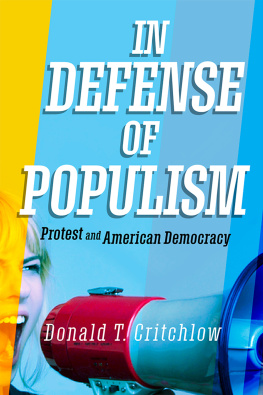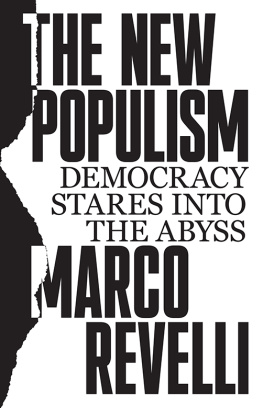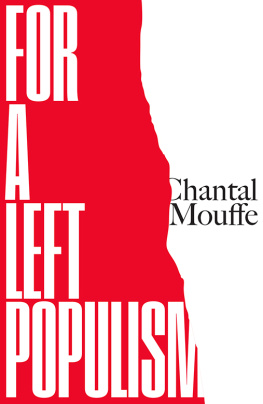Democracy and Populism
Here you can read online Democracy and Populism full text of the book (entire story) in english for free. Download pdf and epub, get meaning, cover and reviews about this ebook. year: 2005, genre: Politics. Description of the work, (preface) as well as reviews are available. Best literature library LitArk.com created for fans of good reading and offers a wide selection of genres:
Romance novel
Science fiction
Adventure
Detective
Science
History
Home and family
Prose
Art
Politics
Computer
Non-fiction
Religion
Business
Children
Humor
Choose a favorite category and find really read worthwhile books. Enjoy immersion in the world of imagination, feel the emotions of the characters or learn something new for yourself, make an fascinating discovery.

Democracy and Populism: summary, description and annotation
We offer to read an annotation, description, summary or preface (depends on what the author of the book "Democracy and Populism" wrote himself). If you haven't found the necessary information about the book — write in the comments, we will try to find it.
Unknown: author's other books
Who wrote Democracy and Populism? Find out the surname, the name of the author of the book and a list of all author's works by series.
Democracy and Populism — read online for free the complete book (whole text) full work
Below is the text of the book, divided by pages. System saving the place of the last page read, allows you to conveniently read the book "Democracy and Populism" online for free, without having to search again every time where you left off. Put a bookmark, and you can go to the page where you finished reading at any time.
Font size:
Interval:
Bookmark:
DEMOCRACY AND POPULISM
BOOKS BY JOHN LUKACS
The Great Powers and Eastern Europe
Tocqueville: The European Revolution and
Correspondence with Gobineau (editor)
A History of the Cold War
Decline and Rise of Europe
A New History of the Cold War
Historical Consciousness
The Passing of the Modern Age
A Sketch of the History of Chestnut Hill College, 19241974
The Last European War, 19391941
1945: Year Zero
Philadelphia: Patricians and Philistines, 19001950
Outgrowing Democracy: A History of the
United States in the Twentieth Century
Budapest 1900: A Historical Portrait of a City and Its Culture
Confessions of an Original Sinner
The Duel: 10 May31 July; The Eighty-Day
Struggle Between Churchill and Hitler
The End of the Twentieth Century and the End of the Modern Age
Destinations Past
George F. Kennan and the Origins of Containment,
19441946: The Kennan-Lukacs Correspondence
The Hitler of History
A Thread of Years
Five Days in London, May 1940
A Students Guide to the Study of History
At the End of an Age
Churchill: Visionary. Statesman. Historian.
A New Republic
JOHN LUKACS
Fear & Hatred


Copyright 2005 by John Lukacs.
All rights reserved.
This book may not be reproduced, in whole or in part, including illustrations, in any form (beyond that copying permitted by Sections 107 and 108 of the U.S. Copyright Law and except by reviewers for the public press), without written permission from the publishers.
Designed by James J. Johnson and set in Minion types by Integrated Publishing Solutions
Printed in the United States of America by R.R. Donnelley & Sons
Library of Congress Cataloging-in-Publication Data
Lukacs, John, 1924
Democracy and populism : fear and hatred / John Lukacs
p. cm.
Includes index
ISBN 0-300-10773-0 (alk. paper)
1. Political scienceUnited StatesHistory20th century. 2. United StatesPolitics and government20th century. 3. IdeologyUnited StatesHistory20th century. I. Title.
JA84.U5L85 2005
320.509730904dc22 2004058450
A catalogue record for this book is available from the British Library.
The paper in this book meets the guidelines for permanence and durability of the Committee on Production Guidelines for Book Longevity of the Council on Library Resources.
10 9 8 7 6 5 4 3 2 1
Tocqueville one hundred and seventy years ago: A new science of politics is necessary for a new world. It has not been forthcoming.
This admittedly radical (here and there) and general historical essay has one large limitation. Its material is limited to the United States, the English-speaking world, and Europe. Its arguments, its evidences and illustrations, are drawn only from this portion of the world, inhabited mostly by the white race, the extent and the numbers of which are now declining. This limitation accords with the limits of my knowledge and of my interests. At this time of so many vacuous generalizations by so many intellectuals who know less and less about more and more (the obverse of the, often fatuous, nineteenth-century quip about specialists who know more and more about less and less), I think that my geographic and cultural restrictions for the theme and scope of this book may be especially proper. For this work attempts descriptions and diagnoses not of material but of mental conditions and tendencies, in accord with my belief that in this mass democratic age material conditions, almost always, matter less than mental conditions and inclinationsindeed, that the very material order (or disorder) of the world is not at all the fundament but the consequence of what many people think. And about the thinking and the mental structures and the traditional (or modern) psychic inclinations of my fellow human beings beyond the (admittedly imprecise) boundaries of what remains of Western civilization I know little or nothing.
A few passages of this book, often rewritten, were taken from a few previously published writings of mine.

ALEXIS DE TOCQUEVILLE was a visionary, and a historical, even more than a political, thinker. He finished and published the first volume of his Democracy in America one hundred and seventy years ago. Note the honest precision of his title: De la dmocratie en Amrique: About democracy in America. His theme was democracy, as it then existed in America. His first volume was mainly about America, his second volume, published five years later, mainly about democracy. For us this second volume is even more relevant and timely than the first. His contemporaries did not think so; that second volume was criticized, wrongly so; the first volume was not.
Of course much has happened since. America is not what it was then. The American people are not what they were then. America is no longer the only, the main, prototype of democracy in the world. Perhaps Tocqueville should be reversed. For a book remains to be written, with the title and theme of American Democracy: that is, what is particularly American in the political and social conditions of the United States; what and how do they differ from French or British or German or Japanese or Russian or Ruritarian democracynow, when all around us, all across the globe seethes, bubbles, froths the still spreading tide, the democratization of the world?
Tocqueville proposed this question already at the end of his first volume:
Those who, after having read this book, should imagine that my intention in writing it was to propose the laws and customs of the Anglo-Americans for the imitation of all democratic communities would make a great mistake; they must have paid more attention to the form than to the substance of my thought. My aim has been to show, by the example of America, that laws, and especially customs, may allow a democratic people to remain free. But I am very far from thinking that we ought to follow the example of the American democracy and copy the means that it has employed to attain this end; for I am well aware of the influence which the nature of a country and its political antecedents exercise upon its political constitution; and I should regard it as a great misfortune for mankind if liberty were to exist all over the world under the same features.
And yet: the evolving history of the democratization of the world is well-nigh inseparable from the Americanization of the world. Not identical; but inseparable. To make the world safe for democracy: this hapless idea of an American president, Wilson (a southern New Englander; a Virginian Puritan), remained more enduring than the revolutionary ideas of his contemporarythey died but a few days apartthe (partly Tartar, partly German) goateed demagogue Lenin. Perhaps Wilsons mindless phrase ought to bemay still bereversed too: how to make democracy safe for the world, which is a big question that Tocqueville would have instantly understood.
Tocqueville is not outdated, since many of the questions that he stated, or suggested, have become more and more obvious. Is democracy the rule of the people, or, more precisely: rule by the people? No: because it is, really and actually, rule in the name of the people. That is not simpler but more complicated than anything before. Yes: in its predominant sense democracy is the rule of the majority. (And how is this majority composed, formed, what does it consist of?) Here liberalism enters. (It did not, and does not always.) Majority rule is tempered by the legal assurance of the rights of minorities, and of individual men and women. And when this temperance is weak, or unenforced, or unpopular, then democracy is nothing more (or else) than populism. More precisely: then it is nationalist populism.
Next pageFont size:
Interval:
Bookmark:
Similar books «Democracy and Populism»
Look at similar books to Democracy and Populism. We have selected literature similar in name and meaning in the hope of providing readers with more options to find new, interesting, not yet read works.
Discussion, reviews of the book Democracy and Populism and just readers' own opinions. Leave your comments, write what you think about the work, its meaning or the main characters. Specify what exactly you liked and what you didn't like, and why you think so.

